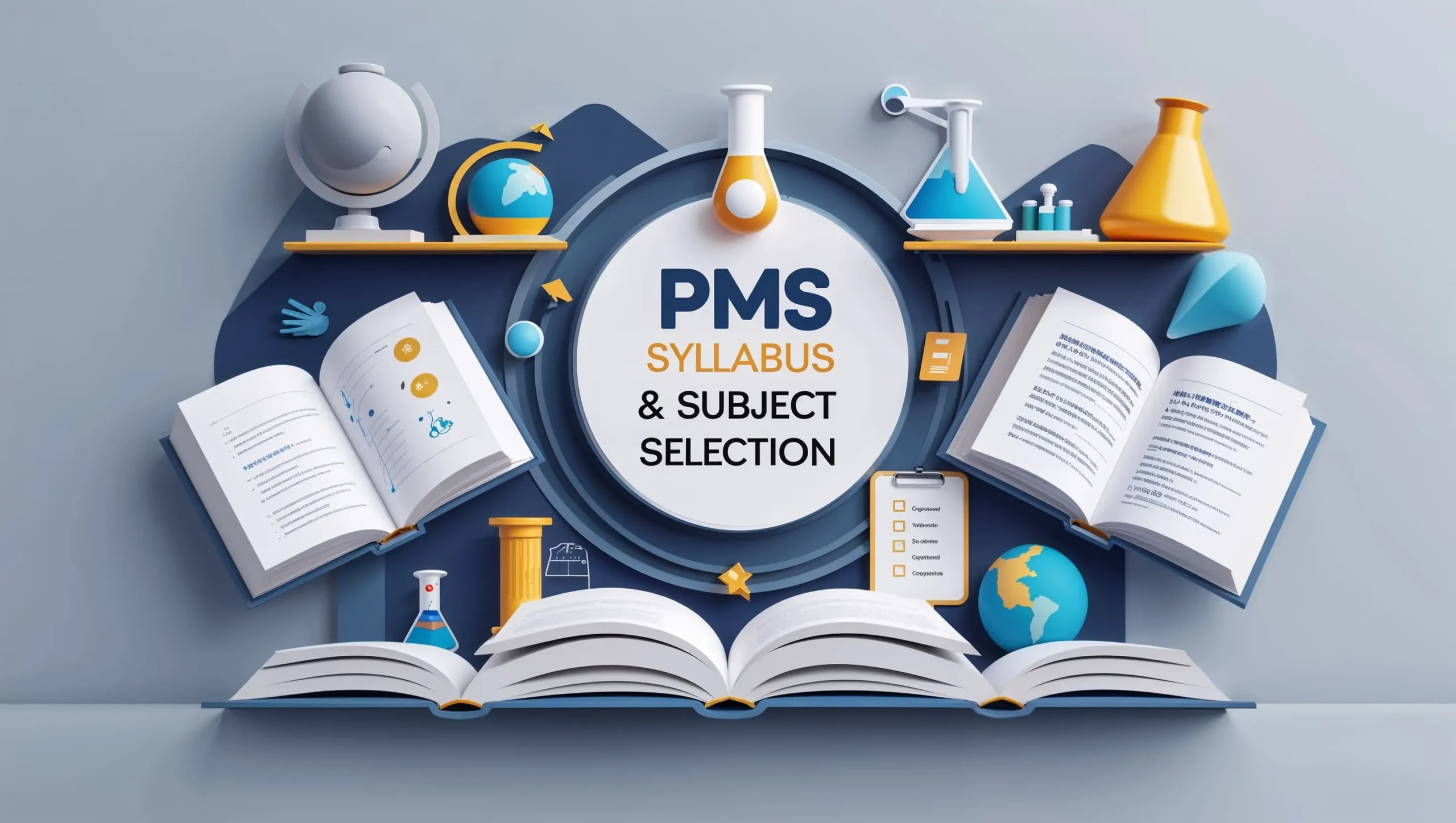PMS Exam

Crack the PMS Exam – Your Ultimate Resource Hub for Preparation of PMS Exam of Punjab, KPK, Sindh & Balochistan
Everything you need to succeed in the Provincial Management Service (PMS) exam. From updated syllabi to past papers, expert guidance, mock tests, and more — all in one place.
What is the PMS (Provincial Management Service) Exam in Pakistan?
The PMS exam, also known as Provincial Management Services, is a competitive examination conducted by the Public Service Commissions of each province: Punjab (PPSC), Khyber Pakhtunkhwa (KPPSC), Sindh (SPSC), and Balochistan (BPSC). It recruits talented individuals into the provincial bureaucracy for officer-level positions such as Section Officers, Assistant Commissioners, and other Class-I posts.
PMS is equivalent to the CSS exam at the federal level but focuses on provincial administration and development.
PMS Exam – Province-wise Overview
Punjab PMS (PPSC)
Conducted by: Punjab Public Service Commission (PPSC)
Frequency: Annually (subject to vacancies)
Eligibility: Bachelor’s Degree from a recognized university
Language Medium: English / Urdu
Syllabus: View Syllabus
Past Papers: View Papers
Punjab Domicile RequiredKPK PMS (KPPSC)
Conducted by: KP Public Service Commission
Eligibility: Bachelor’s Degree from a recognized university
Syllabus: View Syllabus
Past Papers: View Papers
KPK Domicile RequiredSindh PMS (SPSC)
Conducted by: Sindh Public Service Commission
Structure: Divided into Executive & Secretariat group
Exam Pattern: View Details
Syllabus: View Syllabus
Sindh Domicile RequiredBalochistan PMS (BPSC)
Conducted by: Balochistan Public Service Commission
Language Medium: English / Urdu
Syllabus: View Syllabus
Past Papers: View Papers
Balochistan Domicile RequiredEligibility Criteria for PMS Exam – Age, Education, Domicile, Attempts


PMS Syllabus & Subject Selection
PMS Syllabus (Compulsory + Optional Subjects)
- 6 Compulsory Subjects (English, Essay, GK, Islamiat, Urdu, Pak Affairs)
- Optional Subjects – Choose according to interest
PMS Exam Preparation Resources:
Get exclusive access to a complete range of PMS (Provincial Management Service) exam preparation materials tailored for Punjab, KPK, Sindh, and Balochistan candidates.
Past Papers Archive
Access a comprehensive collection of PMS past papers, categorized by subject, year, and province (PPSC, SPSC, KPPSC, BPSC). A valuable tool to understand paper trends and expected questions.
Preparatory Materials & Study Guides
Download expert-created notes, solved assignments, mock tests, summaries, and strategy guides designed to boost your conceptual clarity and exam readiness.
PMS MCQs Practice Bank
Test your PMS knowledge with thousands of topic-wise Multiple Choice Questions (MCQs). Includes detailed explanations to help reinforce your understanding and exam strategy.
English Learning & Writing Skills
Strengthen your English grammar, vocabulary, comprehension, and writing – critical for PMS Essay, Precis, and English Paper. Access tailored lessons, vocabulary builders, and writing exercises.
Detailed PMS Syllabus & Subject Insights
Explore the latest official PMS syllabus for all compulsory and optional subjects. Get advice on high-scoring subjects, subject combinations, and recommended books.

Frequently Asked Questions About PMS Exam in Pakistan
Q1: What is the difference between CSS and PMS?
The Central Superior Services (CSS) exam is conducted by the Federal Public Service Commission (FPSC) for recruitment into federal government positions, whereas the Provincial Management Service (PMS) exam is administered by provincial public service commissions (e.g., PPSC, KPPSC, SPSC, BPSC) for recruitment into provincial government positions. CSS officers serve at the federal level and may be posted anywhere in Pakistan, while PMS officers serve within their respective provinces. Both exams are competitive and require a bachelor’s degree, but the focus and scope differ based on the level of government.
Q2: How often is PMS conducted in each province?
The frequency of the PMS exam varies by province:
- Punjab (PPSC): Conducted annually, subject to vacancies.
- Khyber Pakhtunkhwa (KPPSC): Held based on provincial requirements.
- Sindh (SPSC): Scheduled as per provincial needs.
- Balochistan (BPSC): Organized according to provincial demands.
It’s advisable to regularly check the official websites of the respective public service commissions for the most accurate and up-to-date information.
Q3: Can a CSS aspirant apply for PMS?
Yes, a candidate who has appeared for the CSS exam and meets the eligibility criteria for PMS can apply. However, it’s essential to note that the eligibility requirements, such as age limits and domicile, may differ between CSS and PMS exams.
Q4: What is the age limit for PMS exams?
The general age limit for PMS exams is 21 to 30 years. However, certain relaxations apply:
- Government Employees: Up to 35 years for those with at least 4 years of service.
- Special Persons: Up to 10 years relaxation.
- Khyber Pakhtunkhwa (KP): As of February 2025, the age limit has been raised to 35 years, and the number of attempts has been increased from three to four for the next two years.
Q5: What is the educational qualification required for PMS?
Candidates must possess a bachelor’s degree (14 years of education) from a recognized institution, with at least a second division (45%) or equivalent CGPA.
Q6: What is the selection process for PMS?
The PMS selection process involves:
- Written Examination: Comprising compulsory and optional subjects.
- Psychological Test: Assessing the mental aptitude and personality traits of candidates.
- Viva Voce (Interview): Evaluating the candidate’s communication skills, general knowledge, and suitability for the role.
Q7: How many attempts are allowed for PMS?
The number of attempts varies by province and is subject to the respective public service commission’s regulations. For instance, as of February 2025, the Khyber Pakhtunkhwa Public Service Commission (KPPSC) increased the number of attempts from three to four for the next two years. It’s advisable to check the official website of the respective provincial public service commission for the most accurate and up-to-date information.
